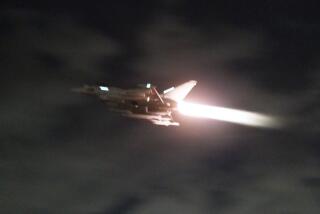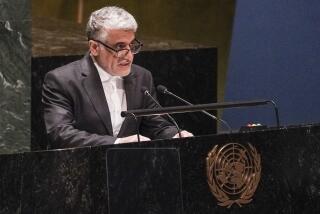Turkey Worries Iraq Is Next on U.S. List of Targets
- Share via
INCIRLIK, Turkey — With a deafening roar, a U.S.-made F-16 fighter jet streaks across the sky above this drab town about 320 miles west of the Iraqi border.
“The Americans are heading for Afghanistan again, but soon they will be hitting Iraq,” says Adem Yavuz, whose souvenir shop caters to about 3,000 American military personnel and their families at the U.S. air base here. “More American soldiers will come. It will be great for business.”
His enthusiasm is not shared by Turkey’s leaders. Prime Minister Bulent Ecevit, scheduled to meet Wednesday with President Bush in Washington, is expected to convey his unease over the prospect that Iraqi President Saddam Hussein will be the next target of the U.S. war on terrorism.
One concern is that such an effort, whether it succeeds in toppling Hussein, might fragment Iraq. That might create a breakaway Kurdish state along Turkey’s border and revive separatist unrest among the nation’s 12 million Kurds. The Turkish army fought for 15 years before taming a Kurdish insurgency in 1999.
Another worry is that Hussein will point his weapons of mass destruction at Turkey if U.S. forces use bases on Turkish soil to attack Iraq. Ecevit is expected to seek the return of Patriot missiles that were deployed at Incirlik after U.S. airstrikes against Iraq in 1998 but were withdrawn in 2000.
Bush administration officials and U.S. senators have begun sounding out Turkish leaders and Iraqi Kurds about supporting a drive to oust Hussein, who survived the 1991 Persian Gulf War after his army was driven out of Kuwait.
With U.S. encouragement, Kurds in northern Iraq rebelled against Hussein during that war, then felt betrayed when U.S.-led forces stopped short of Baghdad, the Iraqi capital. The outcome left Turkey uneasy as well, and both parties have been noncommittal about supporting a new offensive.
“The Turks fear that the Americans will create a situation of chaos and turmoil in Iraq and then not end it in some definitive way,” said professor Dogu Ergil, a Middle East specialist at Ankara University in the Turkish capital. “Bush will need to persuade Ecevit as well as the Iraqi Kurds . . . that this time [the Americans] are going to finish the job.”
The challenge for Washington is that the Ecevit government wants assurances that Iraqi Kurds will not gain independence, said a senior Western diplomat in Turkey, and the Kurds want “guarantees that they will get something pretty close if not independence.”
Ecevit can expect a sympathetic hearing at the White House thanks to Turkey’s unwavering support for the U.S.-led campaign in Afghanistan. About 260 Turkish troops are heading to South Asia this week as the first predominantly Muslim force in a British-led peacekeeping mission. Since October, Afghan-bound U.S. bombers and transport planes have refueled at Incirlik.
The base was a staging point for allied airstrikes during the Persian Gulf War, and U.S. and British warplanes stationed there have since monitored a “no-fly” zone over northern Iraq to protect 3 million Iraqi Kurds from attack by Hussein’s forces.
If Turkey is asked to back a new assault on Iraq, use of the base will be an issue. In an hourlong meeting this month between Ecevit and nine U.S. senators, Sen. Joseph I. Lieberman (D-Conn.) said he told the Turkish leader that the war on terrorism will not be over “until the toppling of the Saddam regime in Baghdad,” but that “everything will be made in consultation with Turkey vis-a-vis Iraq.”
Since that assurance, some Turkish officials have softened their public misgivings about targeting Iraq.
“We are not concerned about Saddam Hussein; we want a democratic Iraq,” Gen. Huseyin Kivrikoglu, Turkey’s armed forces chief, said Monday. “It is Iraq’s territorial integrity that concerns us.”
“The Americans will need Incirlik again if they really want to get rid of Saddam, and the signs are that they do,” said another senior Turkish official, who spoke on condition of anonymity. “If so, we cannot stand in their way, we can only try to extract maximum compensation.”
Such were Turkey’s expectations during the Gulf War. Turkish leaders now complain bitterly that, after Iraq, their nation was that conflict’s biggest loser. Turkey has lost an estimated $40 billion in trade because of U.N. sanctions against Iraq.
The Kurdish-dominated provinces bordering Iraq have been the hardest hit. Their losses have been softened somewhat by the region’s sale of about $250 million a year in food, construction materials and humanitarian supplies to Iraq under a U.N.-approved “oil-for-food” program, but a new war would kill that trade.
“Before the war we used to be able to bring bread to our table. Now we can barely survive. A second war will make us starve completely,” said Bedrettin Karaboga, chairman of a regional entrepreneurs’ lobby in Turkey’s largest Kurdish-dominated city, Diyarbakir.
Unemployment in the impoverished Kurdish provinces prompted thousands of youths to join the uprising against the Turkish army. The vacuum left by Hussein’s forces in northern Iraq drew the rebels there to set up bases, from which they staged cross-border raids against Turkish security targets.
In Incirlik, the idea of going after Hussein is popular. Yavuz, the souvenir seller, said, “I don’t like war, but I like Saddam even less. I hope the Americans get him this time.”
More to Read
Sign up for Essential California
The most important California stories and recommendations in your inbox every morning.
You may occasionally receive promotional content from the Los Angeles Times.












